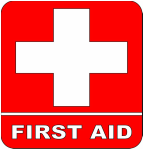|
This past weekend I celebrated Independence Day camping near Austin, Texas. As the night came by and the fireworks started illuminating the sky, I couldn’t help remembering how different fireworks looked seven years ago.
Seven years ago, I was watching the fireworks through my parents’ truck window as we were arriving in Michigan. From July to mid-September, I, along with my parents and two younger brothers, migrated from the Rio Grande Valley in Texas to Michigan to work picking blueberries. Two and a half months of 10 to 12 hour days of hard work were ahead of us -- And like every year, at least one trip to our local health center. You see, in between the branches of the blueberry trees there were always these sneaky poison ivy leaves, which would cause my mother to have an allergic reaction and, year after year, would send her to visit a doctor at the local clinic. Despite coming back every year for the same thing, she was always treated with respect and dignity and found people willing to help her. I remember the staff at the clinic were always nice and did a great job of trying to let migrant and seasonal agriculture workers know about the clinic’s services. Little did I know that, seven years later, I would be working for an organization that helps health center staff. I now work here at NCFH, creating digital products that convey health education messages to health center patients, many of which are agriculture workers, to help them understand how to get care, how to understand and manage their diagnoses, and much more. This year NCFH is celebrating 40 years of service -- Forty years in which the organization has helped migrant and community health centers nationwide improve the health status of farmworker families. I stopped migrating and working in the fields six years ago, but I still remember how helpful getting and having access to care was for my family. My family, I, and many others have benefited from the work that NCFH has done throughout these 40 years and I cannot be more thankful. Thank you NCFH and congratulations on your big 40! By: Joanna Arevalo The Wall of Wonder, an interactive round-table session, was conducted by NCFH and the Northwest Regional Primary Care Association at the 2015 Western Forum for Migrant and Community Health. Participants explored issues of access to care for agricultural workers, including local changes to agriculture and its workforce, impacts in service utilization at health centers, and strategies to increase access to care for agricultural workers and their families. Take a look at the report and the participants' strategies and ideas for increasing access to care. We encourage you to select at least one idea, or create your own to implement in your health center or organization!
 Agriculture is one of the most dangerous occupations, so it is not uncommon for accidents and injuries to occur on the job. For this reason, it is important for workers to learn some first aid tips. In this issue of Health Tips / Consejos de Salud, readers will learn about first aid for some of the most common injuries in agriculture: strains, sprains, and bone fractures. Readers will also learn when to call 911 or go see a doctor. Available in English and Spanish. Visit our website for previous editions. |
The National Center for Farmworker HealthImproving health care access for one of America's most vulnerable populations Archives
July 2024
Categories
All
|




 RSS Feed
RSS Feed